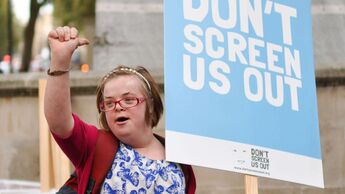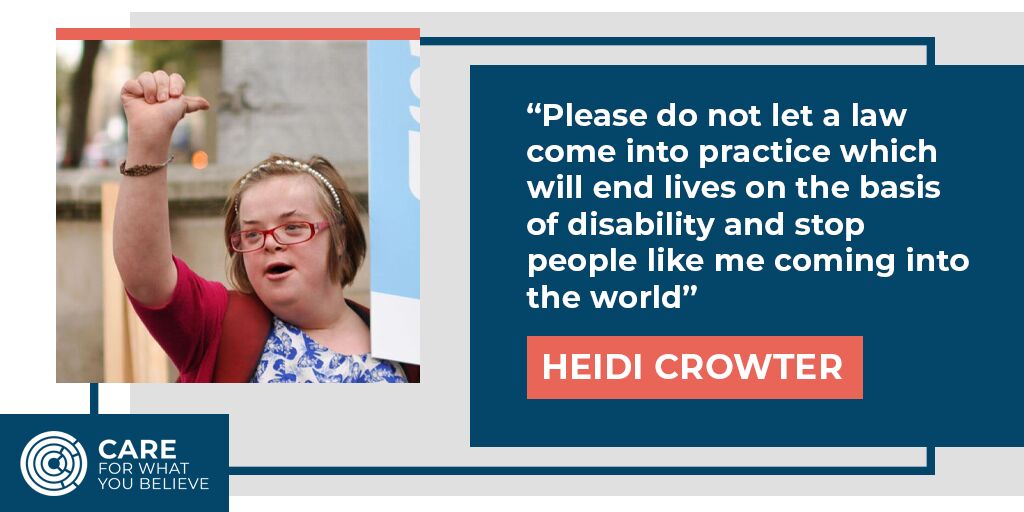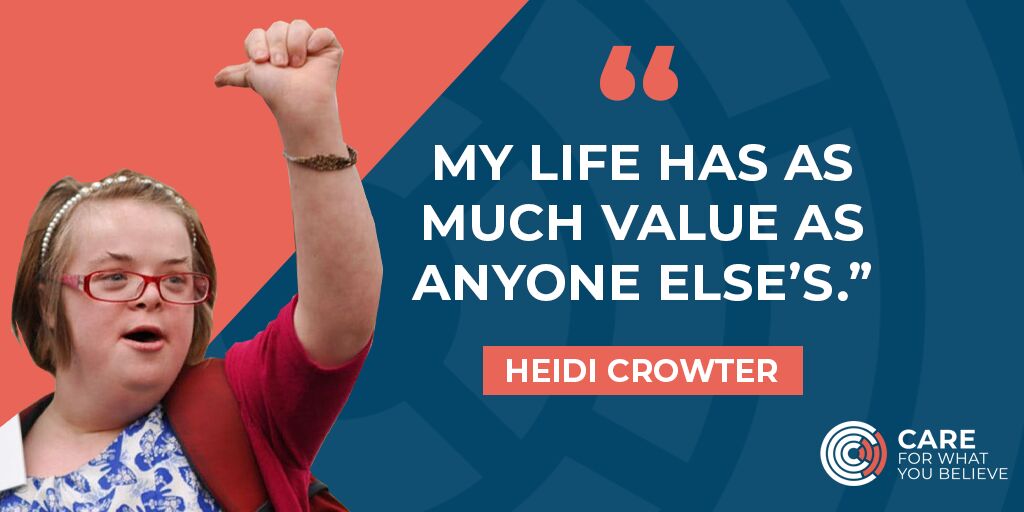
A law that tells people with disabilities that their lives are not worth living should never have found its way onto the statute books. This case, challenging Britain's discriminatory abortion law, could be a major step forward in disability equality.
Last year, I had the pleasure of meeting Heidi Crowter, a disability advocate, as she delivered a petition to Number 10. The petition called on the Government to prevent the imposition of a discriminatory abortion law on Northern Ireland, which would allow for abortion up to birth on the basis of disability. Very sadly, the law passed, putting Northern Ireland on a par with the discriminatory regime that has existed in Great Britain for decades.
Undeterred, Heidi continues in her advocacy on behalf of people with disabilities. She is now contesting Britain’s abortion law in a landmark case that will be heard by the High Court on 6 and 7 July.
It is argued that abortion should be left entirely in the personal realm, particularly when it is this painful. Yet these decisions are not made in a vacuum: they are profoundly influenced by societal attitudes and the law itself.
Tackling discrimination
This case is not arguing about the morality of abortion per se, it is tackling one aspect of the law.
Specifically, that is the discriminatory nature of the Abortion Act 1967. Under the current law, abortions can be carried out on various Grounds up to 24 weeks. The most common Ground is Ground C — that the pregnancy would cause detriment to the woman's mental health.
However, Ground E of the Act allows abortion if a baby will be born ‘seriously handicapped’, and, since the law was changed in 1990, this is available up to birth.
Alongside Máire Lea-Wilson, whose eleven-month-old son Aidan has Down’s syndrome, Heidi is arguing that this aspect of the law discriminates against people with disabilities.
In Britain each year, over 3000 unborn babies are aborted on this Ground. Around 650 of these babies have been aborted because they have a high chance of having Down’s syndrome. Differing reports show the real figure is likely to be much higher.

To many people with a disability, every single one of these abortions represents a declaration that their life is not as valuable as another’s.
Why the law must be reviewed
One argument often used in defence of this practice is that these abortions occur in such minimal amounts that they do not warrant a change the law.
However, to many people with a disability, every single one of these abortions represents a declaration that their life is not as valuable as another’s.
This law directly discriminates against babies with disabilities
Our abortion law is directly discriminatory; it allows for a baby to be aborted on the basis of her disability, which is a protected characteristic under equality law. In this way, it is no different than sex-selective abortion.
Not only can a baby be aborted because of her disability, but this can take place after the 24-week limit – the point when she could survive outside the womb. For the majority of people who take a gradualist view of life in utero — that a baby’s moral worth increases the further she continues in gestation — the point of viability carries a lot of weight. It is even more significant, therefore, that abortion is allowed right up to birth if a baby has the characteristic of disability.
However, a problem arises in that the law does not recognise an unborn baby as a legal person. Whilst those of us who are pro-life recognise the personhood of an unborn baby, a non-person cannot be discriminated against in the eyes of the law. It is thus highly unlikely that a court would find Ground E to be direct discrimination.
The law indirectly discriminates against people with disabilities
If this case succeeds, it will finally send the message to people with disabilities that their lives are just as important and worthy as everyone else’s. That should be something everyone can get behind.
If a baby is a non-person legally, a more plausible argument is that the law is indirectly discriminatory. Allowing abortion for disability up to birth perpetuates discrimination against people with disabilities who have been born. The law sends a message; it tells people with disabilities that ‘because of this characteristic you have, your life is not as valuable.’
There is no doubt that going through a selective abortion is an extremely painful experience for parents — especially if it is a much-wanted baby. Whilst we must always show compassion for those in such situations, this reality can often be used to shut down any challenge to the general practice of abortion for disability. It is argued that abortion should be left entirely in the personal realm, particularly when it is this painful.
Yet these decisions are not made in a vacuum: they are profoundly influenced by societal attitudes and the law itself. Looking at Maire’s story for instance, one has to question how much parents' choices are fuelled by existing discriminatory attitudes towards people with disabilities.
If they are presented with limited and biased information about disability, persistently offered abortions by doctors, and the law says they can abort on this basis, this all sends a collective message to prospective parents. Why on earth would they feel they could cope with a child with a disability? Why on earth would they believe their child could have a good future?

Why abortion for disability contributes to discrimination
As much as abortion advocates would like to assert this, abortion is not personal: what happens inside the womb affects those outside it, because abortion always demonstrates a moral judgement about the way life is valued. That’s why it causes such strong emotions in us, whatever side we fall on.
When it comes to disability, this is no different. It is a vicious cycle: discriminatory attitudes in society lead parents to consider abortion as their only option, but selective abortions themselves perpetuate discriminatory attitudes.
For example, there are anecdotal reports of children with disabilities receiving abuse which patently derives from the practice of selective abortion.
A Parliamentary Inquiry found that this experience was widespread. When investigating the online abuse disabled people receive, they found that the nature of the abuse included “Being told that they should not have been born, being questioned about whether they thought that they should have been aborted and suggestions that they would be better off dead” One respondent to the Inquiry said, “I’ve been called an “it” many times–“What is IT doing?” … I’ve had remarks about how I look in my wheelchair, and a few times the statements, “You should have been aborted”, and, “You don’t deserve to live.”
If this experience is true of many people with disabilities, it is paramount that the law is urgently reviewed. There can be no doubt that it is doing people with disabilities real harm.
Major bodies also challenge discriminatory abortion law
This case only challenges one aspect of our abortion law, and it may not impact significant numbers of abortions. But the fact that it is even being heard by the High Court is significant. It conveys an escalating tension between a society that heralds itself on its commitment to equality, and a law that is inherently unequal.
And this isn’t just the view of a handful of people: major bodies support what Heidi is fighting for.
For example, the UN Committee on the Rights of Persons with Disabilities has criticised Britain’s abortion law, along with other countries, for providing abortion on the basis of disability. It made a key recommendation that Britain change its abortion law, which was ignored by the Government.
This view was backed up by the Disability Rights Commission who described the Abortion Act 1967 as "offensive to many people" and said it "reinforces negative stereotypes of disability" and "is incompatible with valuing disability and non-disability equally."
Support Heidi and Máire
People like me are considered to be ‘seriously handicapped’, but I think using that phrase for a clause in abortion law is so out of date...last year, me and other members of the Down’s syndrome community set out to get rid of the clause in the law, and now our case will soon be heard in the High Court. I hope we win. People shouldn’t be treated differently because of their disabilities, it’s downright discrimination.”
This case only challenges one aspect of our abortion law, and it may not impact significant numbers of abortions. But the fact that it is even being heard by the High Court is significant. It conveys an escalating tension between a society that heralds itself on its commitment to equality, and a law that is inherently unequal.
Most importantly, it could have a real impact on the way people with disabilities feel about themselves, and even how they are treated by others.
For Heidi, the current law says her life isn’t as valuable as others.
If this case succeeds, it will finally send the message to people with disabilities that their lives are just as important and worthy as everyone else’s. That should be something everyone can get behind.
If you want to support the case, visit Heidi’s crowdfunding page.


Share story
The law must stop discriminating against people with Down's syndrome — this case could change that